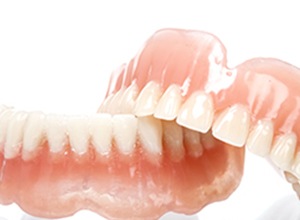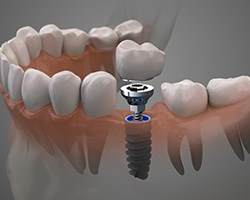Dentures – Enfield, CT
Reliable, Convenient Tooth Replacement
There are several methods available for replacing missing teeth, and dentures are one of the most well-known. Through the years, they have gained a reputation for being inconvenient, clunky, and uncomfortable — but for most patients, that cliché is far from the truth. On this page, we talk more about dentures in Enfield and all the benefits they offer.
What Are Dentures?

Basically, there are two types of dentures: full and partial. Partial dentures replace just a few teeth, whereas full dentures replace an entire arch of teeth (all the teeth on the top or bottom of the mouth). Dentures consist of a few parts:
- The teeth are often made of porcelain or acrylic. These materials look natural and can withstand most of the rigors of everyday life.
- The base is a gum-colored substance, usually resin, that attaches to your gums via natural suction or a dental adhesive.
Who Is a Good Candidate for Dentures?

Dentures are an excellent tooth replacement option for many patients, including those who have lost a few teeth, many teeth, or even all their teeth. When you come in for your consultation, we will learn about your oral health, your budget, and your goals for treatment. From there, we will be able to determine whether dentures are a good fit for you (as well as which type of denture would work best for your unique situation). Even if you are not a candidate for dentures right away, you might become one after some preliminary treatments.
Effects of Missing Teeth

Edentulism (the state of being toothless) can be the result of numerous factors, such as genetics, gum disease, physical trauma, and certain lifestyle choices. Regardless of how you lost your teeth, your condition may have a significant adverse effect on your quality of life. For example, you might experience:
- Feelings of self-consciousness due to the appearance of your incomplete smile.
- The tendency to isolate yourself from social situations, which could lead to loneliness.
- A reduced ability to eat a balanced, nutritious, and tasty variety of foods.
- Facial sagging that makes you look years older.
- Difficulty enunciating certain sounds.
The good news is that dentures can reduce or eliminate the impact of such problems!
What Qualifies You for Dentures?

You may qualify to receive dentures if:
- You are missing all or most of your natural teeth.
- Your natural teeth are in poor condition and will soon need to be extracted.
- Your gums and jawbone are healthy enough to support dentures. (If they are not, you might need to undergo some restorative care before you move forward with tooth replacement.)
- You have good oral habits that will support the long-term success of your tooth replacement treatment.
Alternative Tooth Replacement Options

If you do not qualify for dentures, or we determine they are not the right form of tooth replacement for you, we might suggest an alternative way to rebuild your smile, such as:
- A traditional dental bridge. These prosthetics are good for replacing one or more teeth. They rely on the nearby natural teeth for support. They can be very sturdy and have the potential to last for a decade or longer. They are also cost-effective.
- Dental implants. Implants are prosthetic tooth roots. Once they are surgically placed beneath the gumline, they can serve as a sturdy base of support for crowns, bridges, and dentures. Although they are on the pricier side, we often recommend them because they offer even more substantial and long-lasting benefits than traditional forms of tooth replacement.
How Do Dentures Work?

To begin your journey toward a renewed smile, visit your dentist in Enfield for a consultation. We will evaluate your oral health and make a recommendation on the best method for replacing your missing teeth. If dentures are right for you, we may have to extract any remaining teeth you have that would interfere with the way your dentures fit. Then, we will make impressions of your mouth and begin the process of designing and fitting your custom new smile.
Exactly how long it takes for you to get your dentures will depend on whether we need to extract any teeth (your gums will need time to heal). The general timeline for getting dentures is anywhere from a couple of weeks to a few months.
After you get your new dentures, it is important that you come in for regular dental checkups. We will want to make sure that your gums are healthy and that your prosthetic teeth are continuing to fit well. The dentures may need periodic refitting or even replacement.
Benefits of Dentures

Dentures come with a number of advantages. For example, they are one of the most affordable options for tooth replacement. They can also look amazing and feel very comfortable. Would you like to learn more about how dentures may be able to benefit you personally? We can talk about that during your consultation. In the meantime, you can gain a general knowledge of the benefits of dentures by reading the material below.
Psychological Benefits

Edentulism (the state of being toothless) can do more than just affect the way your mouth looks and feels. It also has the potential to profoundly affect your mental health. You might feel very self-conscious in public due to your appearance, or you may hesitate to speak because enunciating certain sounds is difficult. You might even go so far as to isolate yourself socially, leading to feelings of loneliness.
Fortunately, dentures can replace your lost teeth and may give you the confidence boost you need to feel like yourself again and once more enjoy meaningful social interactions.
Clearer Enunciation

Human speech is the result of interactions between multiple structures in the body, including the teeth. Without a full set of teeth, you might find it difficult to clearly enunciate certain sounds. As a result, you might hesitate to share your thoughts and opinions.
Dentures replace lost teeth. When you first get them, you might develop a slight lisp. With time and practice, though, you are likely to find that your speech is clearer and easier than it was before you received your prosthetic.
Improves Nutrition

Edentulism might cause you to eat mostly soft foods that have limited nutritional value. As a result, your overall health might decline.
Dentures can restore a degree of chewing power. In fact, they are able to handle a broad range of foods, including things like fruits, veggies, and tasty meats. As long as you use proper eating techniques, you should be able to enjoy a very healthy and delicious diet.
Preserves Oral Health

If you still have some of your natural teeth, a partial denture may benefit them in at least two ways:
- Prevent dental drift. In other words, a denture can prevent your remaining teeth from shifting out of place and leading to a misaligned bite.
- Bear chewing forces. A denture can take some of the force of chewing, which can reduce the risk of premature wear and tear on your natural enamel.
Expands Opportunity

It may be unfair, but the sad truth is that obvious signs of poor oral health, such as missing teeth, may adversely affect your career prospects. An incomplete smile may give the wrong impression about you and make it more difficult for you to get a new job or advance in your current position. In contrast, a complete set of attractive teeth can convey the idea that you are youthful, energetic, approachable, and successful.
Understanding the Cost of Dentures

The cost of dentures in Enfield depends on a few factors, including the materials used to make them, the type of denture, and how much of the price your insurance is willing to cover. During your restorative consultation, we will give you a candid estimate for how much you may have to pay out of pocket. We will also help you apply for low-interest financing through CareCredit if you do not wish to pay for your prosthetic upfront. Generally speaking, dentures are one of the most cost-effective tooth replacement options.
Factors that Affect the Cost of Dentures

Some of the main factors that affect the cost of dentures include:
- Some patients require extractions or other treatments before they can get dentures. Each preparatory treatment has its own cost.
- The base of dentures is usually made out of acrylic, and the teeth can be either acrylic or porcelain. There are varying kinds of these materials, and the specific ones used in your prosthetic will affect your overall financial obligation.
- Type of denture. Full dentures, partial dentures, and implant dentures all have different price points.
Be wary of any deals for “cheap” dentures that you may come across. Their quality may not be what you are hoping for.
Are Implant Dentures More Expensive?

Yes, implant dentures in Enfield have a higher upfront cost than traditional dentures. The higher cost is due to several reasons, including the extra time, effort, and expertise that are required during the implant denture process. Despite their price, however, most patients who get implant dentures regard them as a great value. They offer remarkable stability, strength, and function — all things that are difficult to assign a monetary value to. Plus, they last for so long that over time, they may actually end up costing less than traditional dentures that need to be replaced every 5 – 7 years.
Does Dental Insurance Cover Dentures?

In most cases, yes, dental insurance is willing to pay for at least a portion of the cost of dentures. They are generally considered to be a major procedure, which means that about 50% of their price may be covered, up to the amount of your plan’s annual maximum. Our practice is in-network with a number of major plans, and in most cases, we are able to help patients take advantage of out of network benefits as well.
Other Options for Making Dentures Affordable

As your denture dentist in Enfield, we want you to be able to afford your treatment. To that end, we offer a few convenient provisions:
- We are partnered with CareCredit, a third-party company that provides low-interest and no-interest financing for dental and medical services. Most patients qualify for credit. If necessary, our team can walk you through the application process.
- Essential Dental Plan. This savings plan is designed for patients without insurance. In exchange for a reasonable fee, you can enjoy discounts on virtually all the services we offer.
Would you like to learn more about dentures and their cost? Get in touch with us today to schedule your consultation. We look forward to serving you!
Dentures FAQs

As an experienced denture dentist in Enfield, our team is ready to help you regain a complete, functional smile. Before you schedule your denture consultation, however, you may want to know more about the road ahead. That is why we have compiled a brief list of frequently asked questions about dentures, along with succinct answers. If you do not see the information you were specifically looking for, give us a call. We are always happy to personally share our knowledge.
How Long Will You Have to Wait to Get Dentures After Your Teeth Are Pulled?
This can vary from patient to patient. Traditionally, the wait time between extractions and getting dentures in Enfield is 6 – 8 weeks. This allows time for the gums to heal. However, some people opt to get immediate dentures, which are placed right after extractions. Immediate dentures must be adjusted multiple times so they maintain their fit as your mouth changes following your extractions.
If you are getting implant dentures, you may have to wait a few months or longer after extractions before you get your new teeth. (The exception to this is if you are getting All-on-4, which often allows temporary dentures to be placed on the same day as extractions.)
Should I Have All My Teeth Pulled to Get Dentures?
We always prefer to save natural teeth if they are still reasonably healthy. Therefore, if your teeth are still in good shape, we may recommend that you get a partial denture, which will fit in around them and fill in the spaces left by teeth that are already missing. However, if your teeth are badly decayed or you are suffering from advanced gum disease, it will likely be necessary to extract them before you can get dentures. In many cases, we are able to perform all necessary extractions in a single appointment. However, we may also do it across multiple appointments to enhance patient comfort.
Can I Sleep with My Dentures?
When you first get your denture, we may recommend that you wear it for 24 hours, including when you are asleep. After that, however, you should remove it every night. This will give you the chance to thoroughly clean your prosthetic, which will lower your risk of infections, bad breath, and other problems. It will also allow your gums to rest, decreasing your chances of developing gum sores. If you wish to sleep with your dentures, it would be best to invest in fixed implant dentures, which are designed to be worn 24/7.
Will It Hurt to Get Dentures?
If you need to undergo extractions before you get dentures, you can expect some soreness after your teeth are pulled. Bleeding and swelling are also common. Fortunately, most patients are feeling fairly normal within a few days to a week after their extractions. When you first get your dentures, you will have to go through an adjustment period. Your gums may be sore for a while as you get used to your prosthetic. Some patients adapt fairly quickly, but for others, it may be months before they are accustomed to their new teeth.
